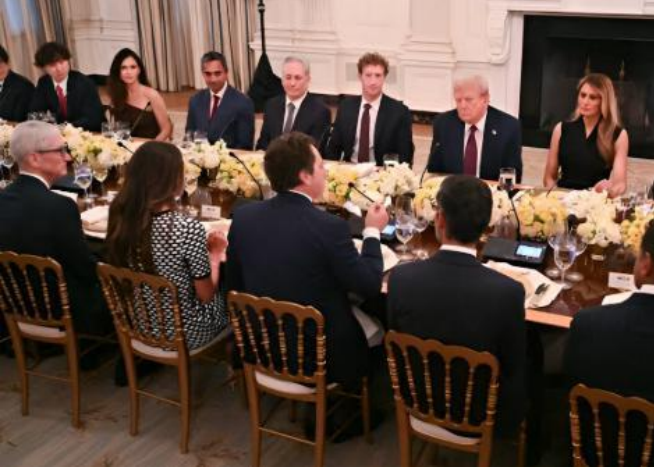A Rare Gathering of Silicon Valley Leaders
In a rare display of unity between Washington and Silicon Valley, U.S. President Donald Trump hosted a private dinner at the Trump White House tech dinner, bringing together Sundar Pichai (Google), Tim Cook (Apple), and Mark Zuckerberg (Meta).
The meeting, described as both strategic and symbolic, underscores the Trump White House tech dinner push to strengthen dialogue with America’s largest tech firms at a time when AI, data privacy, and global competition dominate headlines.
Spotlight on Artificial Intelligence
A major focus of the dinner was artificial intelligence (AI).
- Discussions centered on responsible AI development, global competitiveness with China, and regulatory frameworks.
- Trump emphasized keeping AI research and innovation within the U.S.
- Tech leaders were urged to expand investments in AI infrastructure and workforce development.
Data Privacy and Consumer Protection
Another critical topic was consumer data privacy.
- Tech firms face mounting scrutiny over data collection, storage, and monetization.
- The dinner included talks on federal data protection laws.
- Trump urged executives to commit to stronger safeguards.
- Tim Cook reiterated Apple’s position that privacy is a fundamental human right, advocating for clear federal standards.
Global Trade and Tech Supply Chains
Trade and supply chains also featured prominently.
- Tim Cook raised challenges from supply chain disruptions in Asia, stressing diversification.
- Sundar Pichai pointed to the need for stable U.S. trade agreements to secure semiconductors and critical materials.
- Trump signaled willingness to offer incentives for companies that bring production back to the U.S., aligning with his push for economic security and job creation.
Meta’s Role in Social Media and Elections
Mark Zuckerberg faced questions about Meta’s role in content regulation, especially ahead of U.S. elections.
- Concerns included misinformation, political ads, and social media influence.
- Zuckerberg said Meta is investing in AI-driven moderation and fact-checking partnerships.
- He also flagged global regulatory pressures, calling for coordinated U.S. policies.
Industry–Government Collaboration on Innovation
Beyond specific policies, the dinner emphasized public–private collaboration to maintain U.S. technological leadership.
- Executives showed interest in partnerships for quantum computing, biotechnology, and cybersecurity.
- Trump stressed that the U.S. must stay at the forefront of innovation to protect both its economy and national security.
Symbolism and Strategic Messaging
While concrete policies were not announced, the symbolism was powerful:
- Hosting three of Silicon Valley’s most influential leaders in one room highlights the administration’s priority of closer ties with big tech.
- The gathering signals to global rivals that Washington and Silicon Valley are aligned to defend U.S. digital leadership.
- Observers see this as a possible turning point amid antitrust debates, privacy concerns, and AI regulation.
Looking Ahead
The Trump White House tech dinner may mark the start of a more cooperative era between government and tech giants.
With AI, global supply chains, and data privacy at the forefront, the dialogue between Trump, Pichai, Cook, and Zuckerberg highlights the urgent need for alignment between policy and innovation.
The big question: how will these talks translate into legislation, regulations, and industry practices in the months ahead?
For now, the dinner stands as a historic moment, underscoring both the challenges and opportunities at the intersection of politics and technology.









